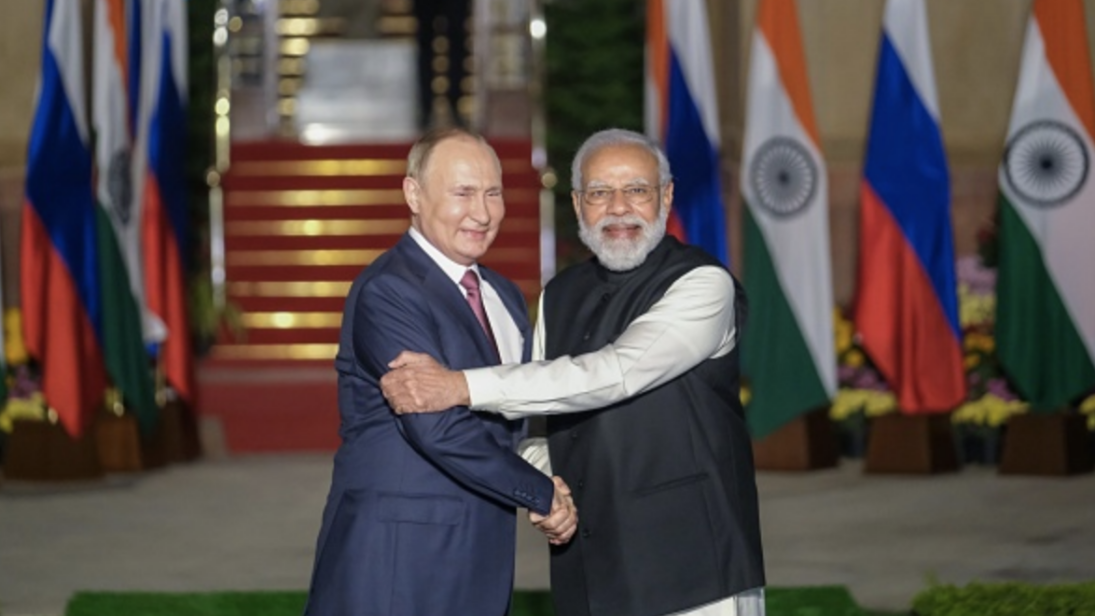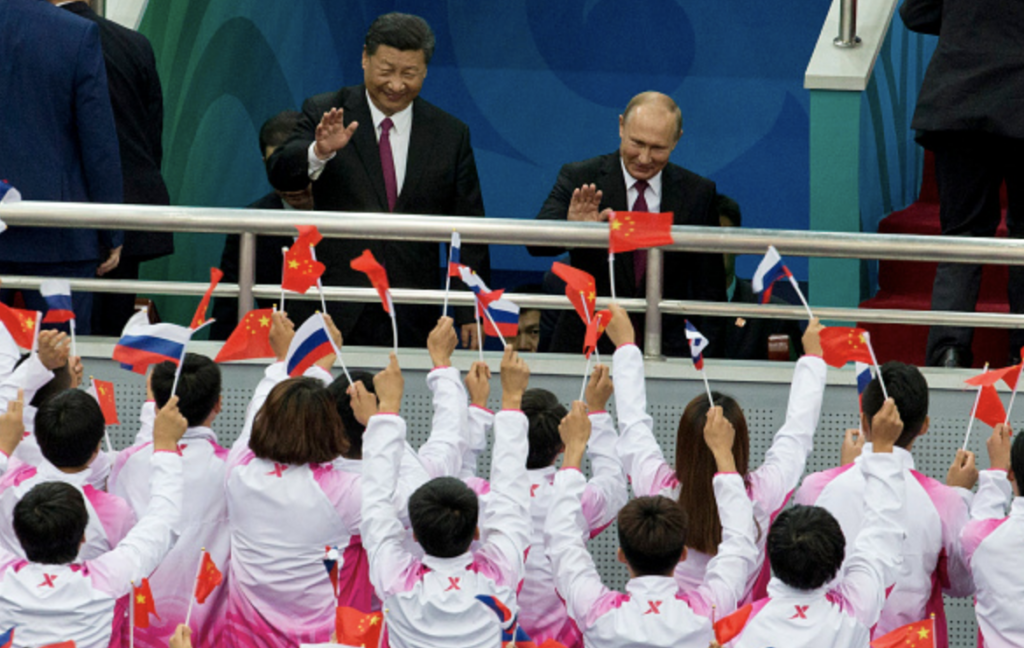
The outbreak of the Russia-Ukraine War and subsequent Western-imposed sanctions on Russia have forced India to navigate an increasingly troubled and sensitive geopolitical landscape. The United States and its allies have implemented unilateral measures on Russia, complicating the Kremlin’s ability to conduct business with ‘third-party’ nations. Consequently, New Delhi faces ever-growing pressure from the United States and the European Union to align with their criticisms of the Ukrainian invasion.
Simultaneously, India remains fixated on its immediate neighborhood, particularly as China-related concerns loom large for New Delhi. China’s recent role in Sri Lanka’s financial crisis and support for Myanmar’s military coup are stark indicators for India of China’s meddling in its neighbors’ affairs. Therefore, isolating Russia would leave Moscow with limited foreign policy options and could push an already economically stagnated Russia to become more dependent on Beijing for trade and political clout. As a result, India is repositioning Russia as a counterweight against China in the fragile trilateral balancing act between the three powers.
Requiring India to publicize its opposition against the Russia-Ukraine War would shift Western focus away from the Indo-Pacific and the China challenge, which New Delhi perceives as much more pressing and immediate. In this climate, India cannot afford to upset the delicate détente between Moscow, Beijing, and Delhi. Alienating Russia might push the Kremlin toward Beijing, counter to India’s best interests.
India’s Historical Connection with Russia
During the Cold War, India maintained a stance of ‘strategic autonomy’ between the United States and the Soviet Union. Under this doctrine, India maintained its neutrality in the U.S.-Soviet rivalry. Instead, Soviet-Indian relations rested on three fundamental pillars: Soviet arms sales to India, a shared belief in state-centered economic philosophy, and the Soviet-India versus U.S.-Pakistan-China geopolitical axis.
India is repositioning Russia as a counterweight against China in the fragile trilateral balancing act between the three powers.
However, since the end of the Cold War, Russia and India have followed different courses. Moscow’s policy vis-à-vis New Delhi was primarily motivated by the faltering state of their previous strong relationship, and Russia’s desire to resuscitate these ties. On the other hand, India viewed its relationship with Russia through the reality of its newfound economic strengths and perceived geopolitical threats emerging from Beijing.
While New Delhi’s partnership with the United States advances through multilateral platforms, such as the Quadrilateral Security Dialogue (Quad), Moscow’s position as a valuable partner has dwindled relative to the Cold War period. India’s participation in these Western-led regional forums stems from New Delhi’s recognition of China as a competitor and looming security threat.
Russia’s Growing Dependence on China
Russia’s invasion of Crimea in 2014 kickstarted an era of harsh economic punishment by Western powers on Moscow, propelling Russia to seek closer ties with Beijing and resulting in its ‘Turning East’ policy. Amid increased international isolation with Russia’s most recent invasion of Ukraine in February, Russia and China have become closer – even declaring a “no-limits” partnership. China has also agreed to pay for gas imports in Russian rubles and Chinese yuan, providing Moscow with a much-needed alternative to the U.S. dollar, while also paving the way for China’s efforts in internationalizing the yuan.
Furthermore, Chinese imports of Russian goods soared 60 percent in August compared to the same period in 2021. In August, exports from China to Russia also leaped 26 percent month-on-month. China had already been Russia’s largest trading partner even before Putin’s invasion, accounting for 16 percent of Moscow’s foreign trade; this is expected to grow as Russia sinks further into its dependence on China.
Despite the shift, China has received Russia’s overtures with some apprehension. The Kremlin’s invasion contradicts the Chinese Communist Party’s commonly repeated stances on non-interference and territorial integrity, especially regarding China’s domestic human rights issues and the status of Taiwan. Unsurprisingly, China has raised “questions and concerns” regarding Russia’s actions in Ukraine, and Beijing is under international pressure to utilize its influence on Moscow to end the war.

From New Delhi’s perspective, Russia plays a leading role in the delicate trilateral détente between the balancing act of the three nuclear-armed powers. India views Russia as a moderating influence on China, and a conduit to manage tensions between New Delhi and Beijing. Maintaining a strategic relationship with the Kremlin has discouraged Russia from fully pivoting East, which would severely upset the delicate balance. However, the phalanx of Western sanctions may be the unwanted nudge that pushes Moscow entirely into Beijing’s camp. Consequently, India seeks to steer clear of abandoning Russia to prevent cementing the Moscow-Beijing axis further.
New Delhi’s Geopolitical Gymnastics
Under the context of an increasingly bipolar world, India’s muted response aligns with its goal of realizing a multipolar world.
New Delhi currently faces a geostrategic dilemma. Its time-tested Cold War partner stands at odds with Western countries that share mutual desires in the Indo-Pacific to counteract China’s rising influence. India has straddled opposing sides since the outbreak of the Russia-Ukraine War; participating in the QUAD and the recently announced Indo-Pacific Economic Framework while retaining robust economic engagement with Russia and China through BRICS and the China-led Shanghai Cooperation Organization (SCO).
India’s decision to remain neutral on the war in Ukraine stems from its concerns with China. To Delhi, its power asymmetry with China has increased over the years, with Beijing becoming more assertive in projecting its assent, especially in India’s regional neighborhood. India participates in multilateral organizations to counterbalance China. For instance, India’s continued participation in the SCO concerns its partners from the Quad, especially in light of Iran’s ascension to the Organization – a move that naturally raises questions about what role the world’s largest democracy can play amid a rapprochement among an axis of three autocracies. New Delhi defended its membership, arguing that its continued association serves as a counterbalance to China.
The United States expects India to align with Washington on critical issues, including the Russia-Ukraine War, due to their shared democratic values. Amidst Western criticism, India remains steadfast in protecting its interests. New Delhi has capitalized on low Russian prices, continuing its purchase of Russian commodities and increasing natural gas and oil imports from Moscow. As a result, India has since become the major consumer of Western-shunned Russian commodities as an additional method for counterbalancing China.
However, while India struggles to balance its relationship with the United States, it is also becoming increasingly difficult for India to balance Russia. Like Washington, Moscow has expectations for New Delhi. Russia has emphasized that opposing Moscow in UN resolutions will be deemed as “unfriendly gestures” with real consequences. Ignoring this warning, India has trodden a fine line by abstaining more than 13 Security Council resolutions condemning the Russian invasion. Similarly, China has abstained on UN votes to condemn Russia, signaling Beijing’s desire to avoid upsetting Moscow. India’s calculus in deciding to abstain from UN resolutions condemning Russia likely accounted for growing Russia-China bonhomie.
India’s condemnation of Russia would be a powerful symbolic display of global dissatisfaction toward Moscow and would demonstrate India’s resolve for democratic principles to Washington.
India’s condemnation of Russia would be a powerful symbolic display of global dissatisfaction toward Moscow and would demonstrate India’s resolve for democratic principles to Washington. However, to New Delhi, joining the chorus would not make a substantial impact in ending the Russia-Ukraine War; it would instead force Moscow to reinforce its relationship with India’s adversary, China. In the U.S-Russia rivalry, New Delhi plays an indispensable role in counterbalancing China when the White House refocuses its full attention on the Indo-Pacific.
Moving forward
In this era of realpolitik, it seems that India will maintain its neutral position for the foreseeable future. New Delhi will likely continue to counter Chinese influence in its neighborhood, evidenced by its rapid response to Sri Lanka’s financial crisis. Simultaneously, India’s relationship with the United States is anticipated to deepen, with New Delhi pragmatically supporting the rules-based order that will facilitate the country’s economic rise and international influence.
Overall, it is unsurprising for India to have maintained a muted attitude to Russia’s ongoing aggression in Ukraine. In this climate, Prime Minister Narendra Modi’s immediate priority is to address Beijing’s intention in the region, aiming to redirect Western attention to the Indo-Pacific. Pressuring New Delhi to choose sides shows a lack of understanding of India’s inherent interests and forces the country to perform difficult geostrategic gymnastics.
***
Image 1: T. Narayan/Bloomberg via Getty Images
Image 2: Ng Han Guan/Pool via Getty Images


